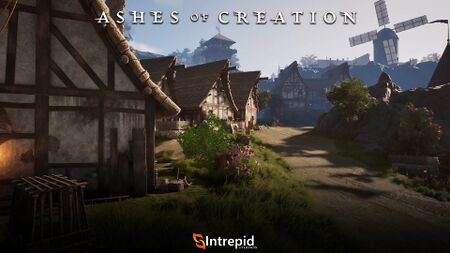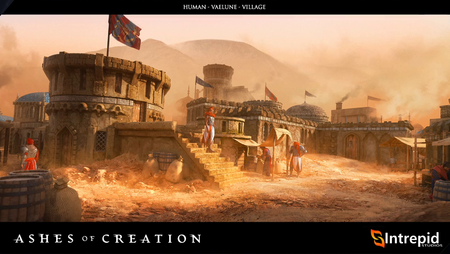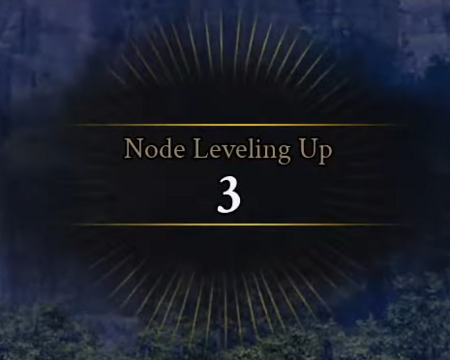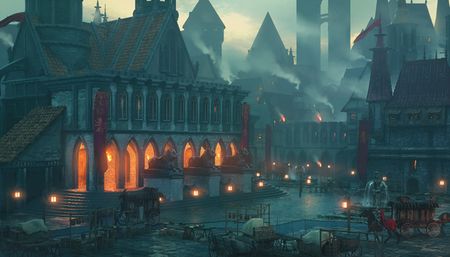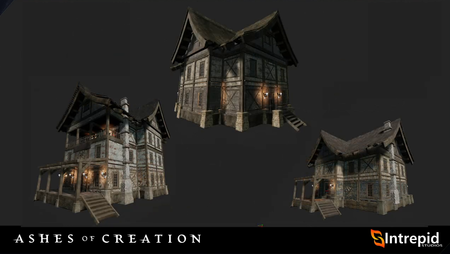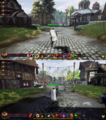Villages
A village is the third stage of node advancement.[4]
- At the Village Stage, the camp becomes a small frontier town. There are some permanent structures in place at this level, as well as the beginning of local Government. The Development Area feels permanent and lived in. You'll find buildings developed with more advanced materials, features such as stone and mortar, fences, and other common structures. The Village Stage will also unlock a Special Building that grants unique utility to its Node Type - Military, Economic, Divine or Scientific; we’ll share further details on those buildings in future entries in this series that cover each specific Node Type.[5] – Margaret Krohn
Node advancement
Citizen and non-citizen player activity (questing, gathering, raiding, etc.) within a node's ZOI counts toward that particular node's advancement (progression) to a higher node stage.[5][7]
The advancement of a node unlocks its unique content, which comes at the cost of locking out an increasing ring of neighboring nodes from progressing to the next stage.[8]
- Nodes advance to the first stage quickly. This enables NPC services such as vending or banking items.[9]
- The more advanced the node is, the larger its ZOI becomes.[4]
- Less advanced nodes (referred to as vassal nodes) that fall within a more advanced node's ZOI can still gain XP, but must remain at a lower advancement stage than the dominant node.[10]
- The vassal system begins when a node hits Village (stage 3), but neighboring nodes starting from Expedition (stage 1) also block the growth of their immediate neighbors.[11][12]
- Certain quests, such as story arcs, may not be able to be turned in after a node has advanced.[13]
- The territory expansion algorithm takes into account the nearest coast, neighboring nodes, and the heatmap of players in surrounding areas over the last weeks or month.[14]
- Due to the way the progression algorithm calculates territorial (ZOI) expansion during node advancement, there is a small possibility that two nodes of the same stage end up being close to each other.[15]
- The way that the algorithm expands the territories takes into account a few things: One it takes into account the coast like where's the closest coast. Two it takes into account the neighboring nodes so it can take over and essentially vassal state those nodes, but what's more important is essentially the initial population based on like how players choose their races. Because we have nine different races and four different starting points that branch out, each server's population density is going to dictate essentially the first few nodes that are highly populated and then that initial seed is what's going to determine the node structure as it moves inland into the into the world essentially; and based on the performance and successes of different sieges will determine which nodes that got locked out from the previous the initial advancements what nodes can now be available to advance further. So I really think that with so many variables that are present in the equation of how nodes advance and stay existing with the more variables you have, the higher likelihood there is for there to be a significant diversion in world progression.[14] – Steven Sharif
- Normally the algorithm that's applied to the node territorial expansion will prevent significant nodes from being in close proximity to each other... There could be a perfect storm where all of the algorithmic progression of territory leads to having these nodes very close to each other because there's certain requirements that should that need to be available to satisfy node vassal takeovers; and it's possible that two nodes would never take each other over as vassals and end up close together and spanning their territories in opposite directions: The Tale of Two Cities thing.[15] – Steven Sharif
- A node does not receive XP from the nodes within its ZOI until these nodes have reached their cap.[10]
- Node experience gain opportunities will be equitable across the four node types.[17]
- Different people have different resources invested in nodes progressing and it would be a little "gamey" if you could know exactly what was necessary at that point because that would disincentivize people from participating.[18] – Steven Sharif
Node advancement spawns a series of animations and visual effects (within the footprint of the node).[19][5]
- Players within the node are teleported to a safe location, likely a respawn area near the node.[19][20]
- Supplies will spawn around the node and system driven caravans are spawned to bring these supplies into the node. These caravans are not able to be attacked.[19]
- NPCs will begin construction activities.[19]
- Players outside the node will see the new facade of the node pop into existence as the node advances in stage.[19]
- The Development Area of a Node is where civilization will appear as the Node advances. As the Node Stage increases, different buildings, NPCs, and services will become available in the Development Area. The higher the Node Stage, the more complex and populated the Development Area becomes. Development Areas will also vary depending on the Node Type - Economic, Military, Scientific, or Divine.[5] – Margaret Krohn
Vassal nodes
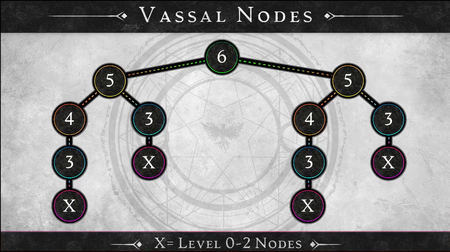
This vassal mode structure tells you what it looks like for a sovereign at a level six metropolis stage; and what it can control at a maximum vassal network is two level five nodes, of which a level five node can control one level four and one level three as direct vassals; and then the four can control a three; and every three can control a one or a two. Now if the three gets removed through siege, the one or the two is removed as well. So that's an important distinction between the three's vassals, which technically isn't really a vassal relationship because there's no citizenships possible. Those vassals don't exist between three and X, but they do exist between four and three, five and four, and six and five. And what this also allows is that because there are 85 nodes that are within the world, we have a buffer zone of about 20 nodes that lives in a max server state. So if you had maximum five metropolises form in a world, you will have a number about 20 nodes that can live alongside those metropolis networks; and when or if a metropolis falls, that extra cushion of nodes around the five metropolis structures allows for the map to be redistricted in a way that is unique. It doesn't mean that one of the fives is just going to pick up where the last six left off and form the same exact metropolis structure. From a territory perspective it has ancillary nodes to play with and expand towards that redistricts the map, so that if a metropolis falls there's a significant difference in the layout of the world and the layout of these almost nation-like territories.[21] – Steven Sharif
Village (stage 3) or higher nodes enslave nearby nodes, converting them into vassal nodes.[22][12]
- A Metropolis (stage 6) can control up to two City (stage 5) nodes. A City (stage 5) can control one Town (stage 4) and one Village (stage 3) node. A Village (stage 3) can control an Encampment (stage 2) or an Expedition (stage 1). If the Village (stage 3) gets destroyed through a siege, its dependant Encampment (stage 2) and Expedition (stage 1) nodes are also destroyed.[21]
- There is a layer of intricacy between how the neighboring nodes advance and what potential parent structure they have in the vassalship tree.[23] – Steven Sharif
- Vassal nodes gain benefits from their regent node (also referred to as sovereign node or parent node) even if the node type of the parent is different to the vassal.[24][25]
- It is not a bad thing to be vasseled, it is a good thing to be vasseled. It brings many benefits from the Sovereign, which is the ultimate parent of that vassal network down to the vassal node itself; and it allows that vassal node to even live outside of its normal mechanics. You get to adopt some of the benefits that the node type of your sovereign is, even if your node type as a vassal node isn't the same.[25] – Steven Sharif
- Regent nodes collect taxes from their vassal nodes. These taxes cannot be taken by the mayor or other players.[27]
- Vassal nodes must remain at least one node stage below their parent node.[22]
- Neighboring/Adjacent nodes from Expedition (stage 1) upward block the growth of their immediate neighbors. This was intended to be tested in Alpha-1.[11][12]
- Vassal nodes first apply any experience earned to their own deficit (see Node atrophy). It then applies excess experience earned to its parent node.[5]
- If the parent node advances, the vassal is once again able to advance.[22]
- Vassal nodes give excess experience to their parent node and may have their own vassals; so long as they fall within the parent node’s zone of influence.[27][22]
- If a node is capped and is both a vassal and has its own vassals, any experience earned from itself or its Vassals is first applied to its own deficit. Experience beyond that is then sent to its parent node.[5]
- When the vassal reaches its cap it overflows experience up to the parent; and so it can be very good early on for parents to get vassal nodes that are very productive- that have a lot of traffic.[27] – Steven Sharif
- Vassals are subject to the government, alliances, wars, taxes, and trade of their parent node, and are able to receive federal aid from them.[22]
- Vassal nodes cannot declare war on their parent node or any of their vassals.[22]
- Citizens of vassals are bound by the diplomatic states of the parent node.[22]
- If a Node is a Vassal Node and is capped from advancing further, it first applies any experience earned to its own deficit (see Node Atrophy section), and then applies excess experience earned to its Parent Node. If the Parent Node advances and the Vassal is able to grow, it becomes uncapped. If a Node is capped and is both a Vassal and has its own Vassals, any experience earned from itself or its Vassals is first applied to their own deficit. Any experience beyond that is then sent to its Parent Node.[5] – Margaret Krohn
Node elections
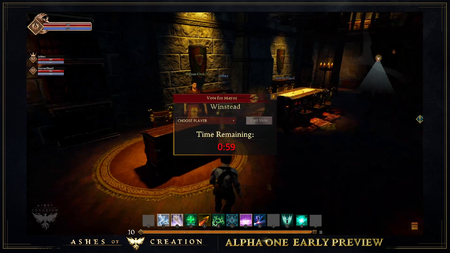
The village stage is a unique stage because that's when the government system comes online and all other stages past village there will have already been a cadence for the election system and it will follow that cadence, but after the initial village stage is completed there will be a one week period where players have an opportunity to establish citizenship at the village that also provides for the cooldown time that is- that would be present on players leaving another node to participate in in this particular node leveling up. But that after that one week period then there will be a one-week election process and then from that point moving forward will be the one month cadence that the node experiences elections on.[29] – Steven Sharif
Once a node has reached Village (stage 3) there will be a one week cooldown period before node elections begin.[29]
- This cooldown period allows players to establish citizenship at the village; which may require them to relinquish previous citizenship at another node.[29]
- Following the initial cooldown, there will be a one week election process, then from that point on, elections will follow a monthly cadence.[29]
- Node sieges may not be declared for 21 days following a node advancing to any stage.[30]
Node elections occur on a monthly basis.[29][32]
- Election notices will be mailed to the accounts of citizens.[33]
- Only citizens of a node may participate in its elections.[34]
- Only node citizens may be elected mayor.[35]
- A king or queen can also become a mayor.[35]
Buildings
Buildings within Ashes of Creation offer goods and services as well as player housing, either within nodes or on freeholds.[4]
- Node buildings are either default buildings that come with the node, or they are constructed buildings that are initiated by the mayor and built by players.[39][40][41][42][43][44][45]
- Freehold buildings that are placed on freehold plots function as homesteads, artisan and businesses buildings.[46][47][48][4][49]
Player housing
| Player housing | Type. | Availability. | Starting count. | Limit. |
|---|---|---|---|---|
| Apartments | Instanced.[4] | Village stage and higher.[50] | 50.[51] | One per character per server.[52] |
| Freeholds | Open world.[4] | Village stage and higher.[4] | Low thousands per server.[46][53] | One per account.[52] |
| Inns | Instanced.[54] | Starting areas and Nodes.[55] | Most accessible.[55] | - |
| Static housing | In-node.[4] | Village stage and higher.[4] | 8.[51] | One per character per server.[52] |
- If you were to think about the level of exclusivity between the different types of housing that we have, obviously the most exclusive when it comes to a quantity is going to be Freeholds, followed by In-node housing, followed by Apartments, then followed by Inns.[56] – Steven Sharif
Real estate
Players buy the deeds for housing from the node itself, or may buy and sell properties from other players.[57][58][59][34][4]
- The developers are considering an auction-based method for listing new properties that become available for purchase when a node advances.[60] Currently freeholds may be acquired via auction.[46][61][62][63][47][64]
- Housing will have a base price that scales with the number of citizens in the node.[65]
- There is no cap on the price of player-originated housing sales.[66]
- In-node housing will be at a premium, and is expected to be hotly contested.[4]
- The more apartments that have been purchased in a node, the higher the price scales.[67]
- Player housing that is destroyed during a node siege can no longer be sold.[68]
- Freehold plots may be purchased from and sold to other players,[57][69] or can be obtained via deeds issued by a Village (stage 3) or higher node.[46][61][62][63][47][64][70][71]
- We're establishing a real estate market that players can invest in and then sell within the in-game economy, but also they are a resource that's subject to removal through the sieging system as well, so there's a bit of risk implied there but the idea is that this is something for players to strive for.[69] – Steven Sharif
- Housing ownership can default back to the node if the owner fails to pay their property taxes. A balance and penalties will be charged to the new purchaser of the home in the manner of a "foreclosure process".[65]
- Players will not be able to exceed their allotment of housing in the game.[75]
- Rental and leasing concepts are under consideration.[75]
Housing benefits
Player housing offers a number of benefits.[58][76]
- Ability to claim citizenship to a node.[77][78][34]
- Additional benefits are granted to home owners who are also citizens of that node.[66]
- Ability to place furniture and other decor items.[79][80][81]
- Houses will be empty when purchased. Players will need to place furnishings and decorations in them.[82]
- Each size of player-owned housing determines how many decor items can be placed in it.[58]
- Storage containers.[81][76]
Each different type of housing offers different additional benefits.[66]
- Apartment benefits include placement of pots to grow seeds and other functional furniture items.[83]
- Freehold benefits include the ability to place business and artisan buildings.[47][80][76]
- Static housing benefits include garden sections for farming special types of crops.[84][85][80]
- Players may grow crops in the garden sections of freeholds or static houses.[83][85][80][86]
- Crafting benches are available in freeholds and static houses but not apartments.[83][80][76]
- Prized items can be displayed within a house.[76]
- Achievements and trophies may be displayed.[76]
- Social activities.[76]
- Housing may provide proximity based bonuses.[76]
Caravans
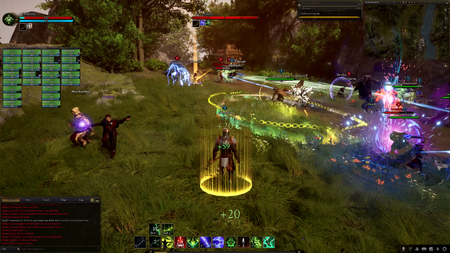
The Caravan System is a major aspect of the economy in Ashes of Creation. While the rewards can be great for moving massive amounts of Commodities and other materials across the world of Verra, players can choose to be Caravan attackers or defenders, making these hotspots for PvP battles.[88]
Caravans are vehicles that facilitate the transfer of cargo across Verra.[90][91][92][93][94][95][96][97][98]
- Caravans are the induction of emergent gameplay, which means you cannot predict the situation you're going to be in when you use a caravan. That's part of the risk: The risk is the unknown. If you could predict it then your ability to mitigate that risk would unfortunately remove that dynamic- that ratio of risk versus reward.[99] – Steven Sharif
- Personal caravans are used to transport cargo for one or more players.[94][95][96]
- Mayoral caravans are used by Mayors to transfer cargo between nodes with established trade agreements or alliances.[92][93]
- Caravans are initiated from and arrive at caravansary node buildings within Village (stage 3) nodes and above.[100][94][101][102]
- Caravans create an objective-based PvP event in the open-world that players can choose to attack, defend, or opt-out of.[103][104][105][106]
- PvE caravan events can cause roadways to be blocked off or hostile mobs to spawn to attack the caravan.[107][108]
- It is possible to launch decoy caravans and merchant ships, but there are visual hints of what is contained in a caravan.[109][110][111] Decoy crates may be available via social organization progression.[109]
Node sieges
As some areas in the world grow, others will fall. This is the foundation of the living, breathing world that is Ashes of Creation, where players will have the ability to make important decisions that matter in the longevity of an area becoming a city, or whether to siege a rival town. Rise above the ashes, create the world around you, and be a part of the story that unfolds because of your actions and decisions.[5] – Margaret Krohn
Node sieges enable players to destroy nodes starting at Village (stage 3).[5] This paves the way for new development and access to the locked content in surrounding nodes. Due to this dynamic, political strife and intrigue play an important role in the structure of the world.[7]
- Sieging nodes will not be an easy task for the attackers. Cities and metropolises will have a considerable defensive advantage.[7]
- There will be systems that mimic some of the mechanics of sieges, but there won't be practice sieges.[113]
- Death penalties do not apply to objective-based events such as node sieges.[114]
- If you own a home in a node and you don't want to see that home destroyed, you need to defend that city![115] – Steven Sharif
- The majority (~80%) of content in Ashes of Creation is open-world but there may be instanced battles within castle and node sieges where specific groups can participate in small, short-duration objective-based battles for specific waypoints.[116]
Monster coin events
Legion monster coin events are common events that occur for Nodes up to the Village stage. This might include a horde of zombies rolling across the countryside finding something or someone to feast on. Players who wish to keep their advancements will need to be vigilant.[117]
Elite monster coin events occur for nodes that exist between the Village and Metropolis stages. This level of event would include something along the lines of a dungeon level bosses and mobs coming into the world to pillage and destroy specific centers of activity.[117]
Visuals
2023-09-21
See also
References
- ↑ X.com - What do you all think about the aesthetic of this Village Node?
- ↑ Livestream, January 30, 2020 (1:07:50).
- ↑ Livestream, November 22, 2019 (50:56).
- ↑ 4.00 4.01 4.02 4.03 4.04 4.05 4.06 4.07 4.08 4.09 4.10 Node series part II – the Metropolis.
- ↑ 5.0 5.1 5.2 5.3 5.4 5.5 5.6 5.7 5.8 Blog - Know Your Nodes - Advance and Destroy.
- ↑ Video, February 29, 2024 (33:57).
- ↑ 7.0 7.1 7.2 A reactive world - Nodes.
- ↑ Video, April 20, 2017 (0:02).
- ↑
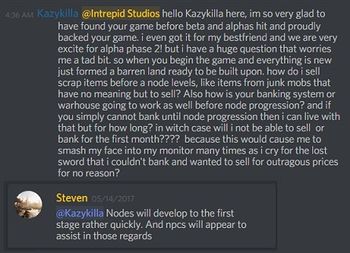
- ↑ 10.0 10.1 Livestream, October 16, 2017 (50:20).
- ↑ 11.0 11.1

- ↑ 12.0 12.1 12.2

- ↑ Livestream, February 29, 2024 (53:58).
- ↑ 14.0 14.1 Interview, July 18, 2020 (10:04).
- ↑ 15.0 15.1 Interview, July 8, 2020 (1:00:15).
- ↑
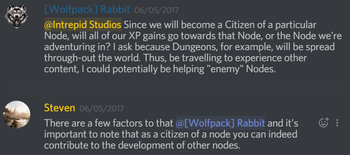
- ↑ Livestream, September 24, 2021 (1:21:23).
- ↑ 18.0 18.1 Livestream, May 26, 2017 (28:16).
- ↑ 19.0 19.1 19.2 19.3 19.4 Livestream, October 14, 2022 (55:13).
- ↑ Livestream, November 17, 2017 (55:27).
- ↑ 21.0 21.1 21.2 Livestream, August 26, 2022 (1:07:34).
- ↑ 22.0 22.1 22.2 22.3 22.4 22.5 22.6 Blog - Know Your Nodes - The Basics.
- ↑

- ↑ Livestream, August 31, 2023 (52:56).
- ↑ 25.0 25.1 Livestream, August 26, 2022 (1:04:35).
- ↑

- ↑ 27.0 27.1 27.2 Livestream, August 26, 2022 (1:10:16).
- ↑ Livestream, March 28, 2020 (1:01:34).
- ↑ 29.0 29.1 29.2 29.3 29.4 Interview, March 27, 2020 (6:03).
- ↑
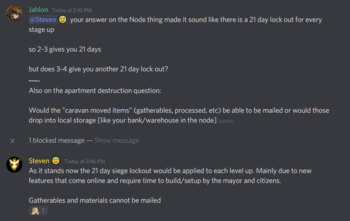
- ↑

- ↑

- ↑ Livestream, October 30, 2020 (1:01:00).
- ↑ 34.0 34.1 34.2 MMOGames interview, January 2017
- ↑ 35.0 35.1 35.2

- ↑ Interview, May 11, 2018 (50:05).
- ↑ Blog: Creative Director's Letter
- ↑ Livestream, January 30, 2020 (1:01:59).
- ↑ Blog: Development Update with Village Node.
- ↑ Livestream, August 31, 2023 (50:25).
- ↑ Video, August 31, 2023 (2:59).
- ↑ Interview, July 9, 2023 (1:32:45).
- ↑ Livestream, May 19, 2017 (33:57).
- ↑ Livestream, January 20, 2018 (38:17).
- ↑ Livestream, 2018-04-8 (PM) (51:49).
- ↑ 46.0 46.1 46.2 46.3 Blog: Exploring the Boundless Opportunities of Freeholds.
- ↑ 47.0 47.1 47.2 47.3 Development Update with Freehold Preview.
- ↑ Livestream, April 7, 2023 (31:49).
- ↑ Livestream, May 24, 2017 (9:58).
- ↑ Steven Sharif - Clarification points from today’s stream.
- ↑ 51.0 51.1

- ↑ 52.0 52.1 52.2 Interview, May 11, 2018 (50:47).
- ↑

- ↑ Livestream, August 31, 2023 (22:32).
- ↑ 55.0 55.1 Livestream, August 31, 2023 (15:51).
- ↑ Livestream, August 31, 2023 (18:13).
- ↑ 57.0 57.1

- ↑ 58.0 58.1 58.2 58.3 Livestream, June 26, 2020 (47:32).
- ↑ Livestream, June 26, 2020 (54:03).
- ↑ 60.0 60.1 60.2 60.3 Livestream, May 12, 2017 (55:01).
- ↑ 61.0 61.1 Livestream, June 30, 2023 (1:12:07).
- ↑ 62.0 62.1 Livestream, June 30, 2023 (14:09).
- ↑ 63.0 63.1 Livestream, June 30, 2023 (13:10).
- ↑ 64.0 64.1 Video, June 30, 2023 (21:22).
- ↑ 65.0 65.1 Livestream, June 26, 2020 (53:41).
- ↑ 66.0 66.1 66.2 Interview, July 8, 2020 (33:34).
- ↑ Livestream, May 12, 2017 (52:01).
- ↑ Livestream, June 26, 2020 (1:02:12).
- ↑ 69.0 69.1 Livestream, June 30, 2023 (1:15:34).
- ↑

- ↑ Livestream, May 19, 2017 (32:23).
- ↑

- ↑ Livestream, June 26, 2020 (56:08).
- ↑ Livestream, June 30, 2023 (1:20:20).
- ↑ 75.0 75.1 Livestream, May 30, 2019 (1:23:41).
- ↑ 76.0 76.1 76.2 76.3 76.4 76.5 76.6 76.7 Livestream, May 10, 2017 (30:53).
- ↑ Interview, July 9, 2023 (38:14).
- ↑

- ↑ Interview, July 8, 2020 (40:20).
- ↑ 80.0 80.1 80.2 80.3 80.4 Livestream, June 26, 2020 (45:32).
- ↑ 81.0 81.1 81.2 81.3 Video, May 31, 2020 (47:32).
- ↑ Livestream, June 26, 2020 (53:20).
- ↑ 83.0 83.1 83.2 Interview, July 9, 2023 (41:22).
- ↑ Interview, February 7, 2021 (42:41).
- ↑ 85.0 85.1 Livestream, October 30, 2020 (44:22).
- ↑ Livestream, May 5, 2017 (32:11).
- ↑ Video, January 31, 2024 (29:15).
- ↑ Newsletter - January 2024.
- ↑ Video, January 31, 2024 (5:22).
- ↑ Livestream, October 31, 2023 (1:30:52).
- ↑ Livestream, October 31, 2023 (1:06:32).
- ↑ 92.0 92.1 Livestream, August 31, 2023 (2:10:23).
- ↑ 93.0 93.1 Video, July 15, 2019 (2:12).
- ↑ 94.0 94.1 94.2 Livestream, August 26, 2022 (1:20:17).
- ↑ 95.0 95.1 Livestream, July 29, 2022 (3:21).
- ↑ 96.0 96.1 Interview, May 11, 2018 (28:21).
- ↑ Livestream, May 15, 2017 (45:20).
- ↑ About Ashes of Creation.
- ↑ Livestream, January 31, 2024 (57:26).
- ↑ Video, October 31, 2023 (10:13).
- ↑ Livestream, May 29, 2020 (46:36).
- ↑ Livestream, July 28, 2017 (20:56).
- ↑ Interview, March 27, 2020 (16:19).
- ↑

- ↑ Livestream, May 22, 2017 (40:40).
- ↑

- ↑ Video, October 31, 2023 (34:12).
- ↑ Podcast, April 11, 2021 (23:36).
- ↑ 109.0 109.1 Livestream, January 31, 2024 (1:15:05).
- ↑ Video, October 31, 2023 (29:36).
- ↑ Livestream, January 29, 2021 (1:25:14).
- ↑ Video, December 4, 2016 (0:02).
- ↑ Twitch Bustin - Practice Sieges?
- ↑ Livestream, December 22, 2020 (1:13:51).
- ↑ Video, April 30, 2017 (5:31).
- ↑ Livestream, January 28, 2022 (17:50).
- ↑ 117.0 117.1 Livestream, May 3, 2017 (36:25).
